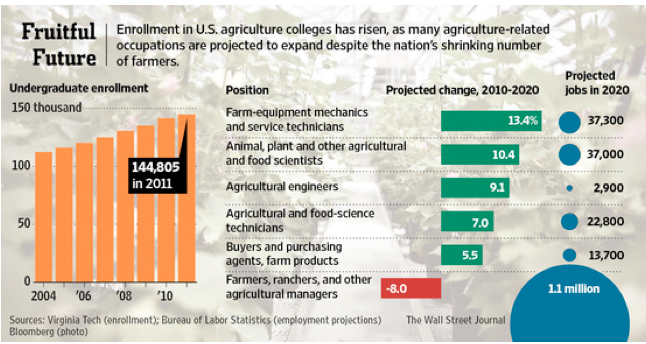While navigating my first National Farm Machinery Show two weeks ago in Louisville, I made note of the number of potential next-generation farmers, dealers and innovators taking in the event.
In every aisle, packs of young FFA members or offspring of baby-boomer growers perused the latest equipment and precision farming technology on display.
It’s a sure bet that not every adolescent attendee will find their way into the farming industry, but there is certainly an abundance of opportunity for those that want to.
A recent article in the Wall Street Journal notes that enrollment at U.S. agricultural colleges and universities is rising, to coincide with an expansion in ag-related occupations, especially in the science and technology field.
According to research conducted by Virginia Tech, undergraduate enrollment at agricultural colleges and departments nationally rose 20% from 2006-2011, to roughly 145,000 students.
The greatest projected job growth from 2010-2020 is for farm-equipment mechanics and service technicians, according to the U.S. Bureau of Labor Statistics.
With farm incomes hitting record levels, farmers have more money to spend on equipment — including precision farming technology. If the hiring projections are accurate, dealerships will likely need to bolster their precision service and support staff to keep pace with customer demand.
As the Wall Street Journal article points out, graduates with science and technology skills are already highly coveted by employers in the ag industry. John Deere is doubling the size of its development program for engineers and recruiting students with degrees in areas like crop science and ag economics.
"Students who have some science credibility and know their way around a farm are incredibly valuable," says Scott Smith, dean of the Univ. of Kentucky's College of Agriculture.
This statement should come as no surprise to farm equipment dealers who are already scavenging for quality precision farming technicians.
Many dealers I’ve talked with say their greatest need to grow their precision farming business is additional help, and then being able to train those hires.
Based on the rising enrollment figures at ag colleges and universities throughout the U.S., it appears that help is on the way.

Perhaps some of those future precision farming dealers were roaming the grounds at the National Farm Machinery Show. On more than one occasion, I noticed young attendees craning their necks to get a look at a yield monitor or conversing with a manufacturer about their latest farm management app on the market.
For the next generation bred on technology, precision farming could come naturally. But for many precision dealers with immediate needs, those future technicians can’t grow up fast enough.



![[Technology Corner] Helping Your Customers Determine Which Technology is Right for Them](https://www.precisionfarmingdealer.com/ext/resources/2025/03/26/Helping-Your-Customers-Determine-Which-Technology-is-Right-for-Them.png?height=290&t=1743084621&width=400)


